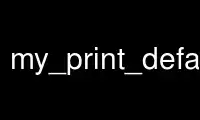
This is the command my_print_defaults that can be run in the OnWorks free hosting provider using one of our multiple free online workstations such as Ubuntu Online, Fedora Online, Windows online emulator or MAC OS online emulator
PROGRAM:
NAME
my_print_defaults - display options from option files
SYNOPSIS
my_print_defaults [options] option_group ...
DESCRIPTION
my_print_defaults displays the options that are present in option groups of option files.
The output indicates what options will be used by programs that read the specified option
groups. For example, the mysqlcheck program reads the [mysqlcheck] and [client] option
groups. To see what options are present in those groups in the standard option files,
invoke my_print_defaults like this:
shell> my_print_defaults mysqlcheck client
--user=myusername
--password=secret
--host=localhost
The output consists of options, one per line, in the form that they would be specified on
the command line.
my_print_defaults supports the following options.
· --help, -?
Display a help message and exit.
· --config-file=file_name, --defaults-file=file_name, -c file_name
Read only the given option file.
· --debug=debug_options, -# debug_options
Write a debugging log. A typical debug_options string is d:t:o,file_name. The default
is d:t:o,/tmp/my_print_defaults.trace.
· --defaults-extra-file=file_name, --extra-file=file_name, -e file_name
Read this option file after the global option file but (on Unix) before the user
option file.
· --defaults-group-suffix=suffix, -g suffix
In addition to the groups named on the command line, read groups that have the given
suffix.
· --login-path=name, -l name
Read options from the named login path in the .mylogin.cnf login file. A “login path”
is an option group that permits only a limited set of options: host, user, and
password. Think of a login path as a set of values that indicate the server host and
the credentials for authenticating with the server. To create the login path file, use
the mysql_config_editor utility. See mysql_config_editor(1). This option was added in
MySQL 5.6.6.
· --no-defaults, -n
Return an empty string.
· --verbose, -v
Verbose mode. Print more information about what the program does.
· --version, -V
Display version information and exit.
COPYRIGHT
Copyright © 1997, 2014, Oracle and/or its affiliates. All rights reserved.
This documentation is free software; you can redistribute it and/or modify it only under
the terms of the GNU General Public License as published by the Free Software Foundation;
version 2 of the License.
This documentation is distributed in the hope that it will be useful, but WITHOUT ANY
WARRANTY; without even the implied warranty of MERCHANTABILITY or FITNESS FOR A PARTICULAR
PURPOSE. See the GNU General Public License for more details.
You should have received a copy of the GNU General Public License along with the program;
if not, write to the Free Software Foundation, Inc., 51 Franklin Street, Fifth Floor,
Boston, MA 02110-1301 USA or see http://www.gnu.org/licenses/.
Use my_print_defaults online using onworks.net services
